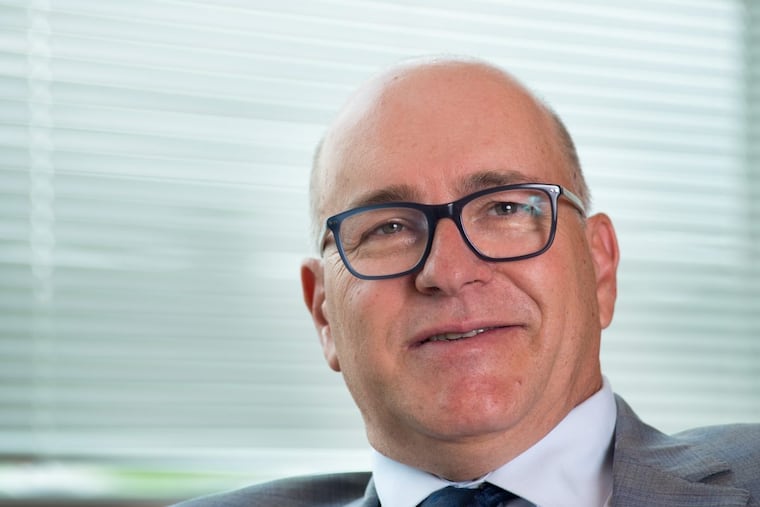Feeling opioid heat, drug distributor's CEO justifies painkiller system
As the Tom Marino news was breaking, Steven Collis, chief executive of Chesterbrook-based AmerisourceBergen, told the Chamber of Commerce for Greater Philadelphia that he wanted to tell his industry's side of the story.

As U.S. Rep. Tom Marino (R., Pa.) was withdrawing his candidacy for President Trump's "drug czar" job Tuesday morning, after the Washington Post/60 Minutes story on how the drugmaker-backed congressman led efforts to block the Drug Enforcement Administration from busting rogue pharma companies that contribute to prescription-drug abuse, the CEO of mega-drug distributor AmerisourceBergen was onstage at the Pennsylvania Convention Center, explaining his company's trade in opioid painkillers.
Steven Collis told 1,500 members of the Chamber of Commerce for Greater Philadelphia that all 20,000 people who work at his Chesterbrook company — including 1,150 in Chesterbrook, Conshohocken, Valley Forge, and Thorofare, N.J. — considered the story "one-sided."
"We want to tell our side of the story," about the "most heavily regulated" U.S. industry, after nuclear power, and maybe banks, said Collis, a native of South Africa.
He reminded the crowd of the drugs' importance as painkillers for cancer and hospice patients. He cited the gratitude of their caregivers. He praised AmerisourceBergen's secure warehouses, its care in shipping dangerous drugs only to licensed medical operators, and its record of reporting "tens of thousands of suspicious orders" to the DEA over the years, even though that ate into company sales. (Those sales topped $147 billion last year, more than Amazon's, GE's or Comcast's.)
"But what is a suspicious order?" Collis added. "We try to ship what our customers need. We don't know who our customer is." That's the job of doctors, pharmacists, and hospitals, said the distributor.
It's tough, telling his side, Collis said: "I wrote an article, 'The Surprising Reality of Opioids.' I could not get it published" by a national publication. So he posted it on his social-media account. (Read it in its entirety on his LinkedIn page, https://www.linkedin.com/pulse/surprising-morality-opioid-distribution-steve-collis/)
Collis acknowledged the "human crisis" of opioid abuse and addiction: "More people have died in this than [the Americans killed] in the Vietnam War." But AmerisourceBergen is doing its part, he told the crowd. "We're being even more proactive." His company is working more with Walgreens, Blue Cross, and others to help pharmacies dump unwanted drugs, so they don't go to addicts, he said.
This has happened before. Drug suppliers like Endo Pharmaceuticals Inc. of Malvern, under pressure after police accounts of overdose deaths, FDA demands to withdraw much-abused drugs, state and local government complaints, private lawsuits, and falling share values, have lately cut opioid sales. As I noted in a September column, "The Opioid Wash Cycle," last month Endo agreed to stop selling Opana ER, a version of an opioid painkiller it had previously stopped selling in 1982, after the last gruesome national overdose crisis.
In December, AmerisourceBergen and Cardinal Health agreed to pay West Virginia $36 million after communities in that state sued Collis' company (and its rivals) for swamping small towns with more opioid pills than residents could use if they were all on prescriptions. The company faces investigations in other states, including Pennsylvania.
In his remarks, Collis also praised the Philadelphia area as a convenient U.S. business base, encouraging Amazon to add its second headquarters here. Collis said he, too, would be looking for new space in a couple of years, when his office leases expire.
Maybe they'll move to Philadelphia, with its large populations of hospitals, medical schools, and painkiller users?
"We're talking to them," Mayor Kenney told me on the way out.
Excerpts from Collis' article:
Sadly, it is difficult to avoid the epidemic of opioid abuse afflicting our country. While the media have helped bring attention and focus to this issue, too many people are experiencing it firsthand ...
The search for accountability has directed significant attention to a relatively unknown but important industry — pharmaceutical distribution ... Nearly every prescription medicine available in the United States moves through [AmerisourceBergen and a few other] distributors who purchase drugs from pharmaceutical manufacturers and sell them to pharmacies ...
Distributors must create a supply chain that is safe and secure. We must ensure our customers are licensed and registered with appropriate entities like the DEA and state boards of pharmacy. And, we need to cooperate with law enforcement ... We report the quantity and details of every order of opioid-based medication we ship directly to the DEA on a daily basis. We use complex algorithms to identify and stop orders that are deemed to be suspicious ...
Why don't distributors, like AmerisourceBergen, simply stop selling these medicines to pharmacies or set limits on the amount of these medicines that can be ordered? These are questions I ask myself regularly ...
The Food and Drug Administration approves opioid-based pain medicines based on the criteria that the drugs' benefits outweigh their risks ... If AmerisourceBergen or our peers made the decision not to fill orders for these therapies, we would put ourselves in a position to interfere with individual clinical decisions that are made by health care providers with their patients ... It would set a dangerous precedent ... The power to override clinical decisions is not an authority that should be granted to us ...
Cancer patients who need to manage their pain might not be able to access approved medicines that could ease their suffering. Hospices may not have the right therapies to provide comfort to patients in their care ... Stopping distribution of opioids would be an easy but amoral choice.